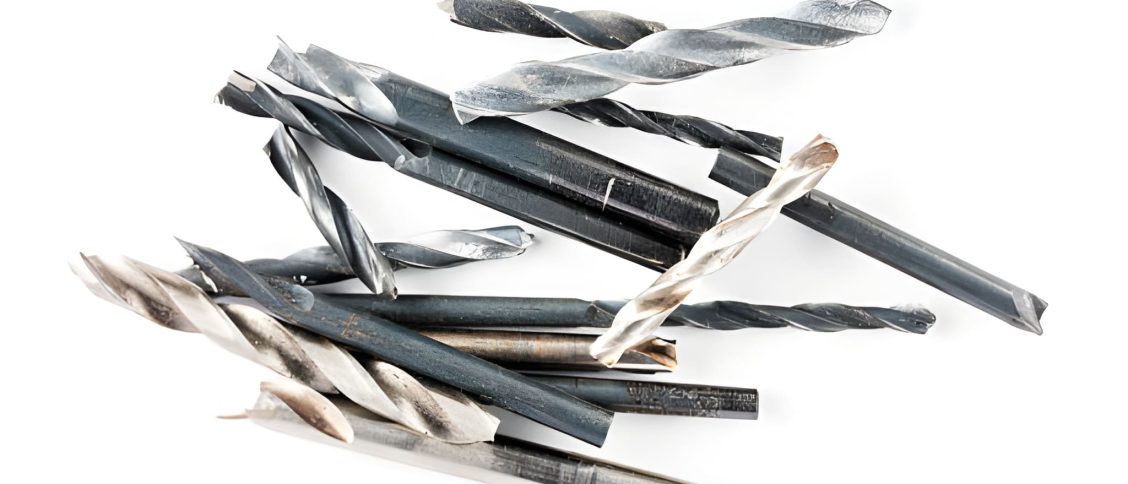Working with hardened steel presents a unique set of challenges that can quickly frustrate even the most experienced professionals. This incredibly tough material, prized for its strength and durability, can destroy standard drill bits in seconds.
Using the wrong tool not only wastes time and money but can also damage your project and create safety hazards. The key to success lies in choosing the right equipment for the job.
This guide is your comprehensive resource for understanding and conquering hardened steel. We will explore why this material is so difficult to drill and what makes specific drill bits capable of handling the task.
You will learn about the critical factors to consider before making a purchase, from bit material and coatings to design features. We will then provide detailed reviews of the best drill bits for hardened steel, followed by a practical buying guide and essential tips for proper use and safety.
What Makes Hardened Steel So Hard to Drill?
Hardened steel is a type of steel that has been heat-treated to increase its hardness, strength, and wear resistance. This process, which involves heating the steel to a high temperature and then rapidly cooling it (quenching), alters its crystalline structure. The result is a material that is significantly tougher and more brittle than standard mild steel.
Drilling into this material presents several distinct challenges:
- Extreme Hardness
The primary obstacle is the material’s sheer hardness. Standard drill bits, typically made from high-speed steel (HSS), are simply not hard enough to penetrate the surface effectively. They will dull almost instantly, skate across the surface, or even shatter.
- Intense Heat Generation
The friction created when drilling into such a dense material generates an incredible amount of heat. This heat can anneal (soften) the tip of an ordinary drill bit, rendering it useless. It can also cause work hardening, making the spot you are trying to drill even harder.
- High Wear Resistance
Hardened steel is designed to resist abrasion and wear. This property works directly against the cutting action of a drill bit, causing rapid dulling and failure. You need a bit that can maintain its sharp cutting edge under extreme pressure.
- Risk of Tool Damage
Forcing a standard bit into hardened steel is a recipe for disaster. The bit can easily break or shatter, sending sharp fragments flying. This not only destroys the bit but also poses a significant safety risk and can ruin the workpiece.
Because of these properties, using common drill bits is not an option. You need specialized heavy-duty drill bits for hardened steel, specifically designed with superior materials and geometry to withstand these demanding conditions.
Factors to Consider Before Buying Drill Bits for Hardened Steel
Material: The Core of the Bit
Choosing the right drill bit involves more than just picking the correct size. To ensure clean, efficient, and safe drilling, you need to evaluate several key factors. Understanding these elements will help you select the professional drill bits for hard metal that best suit your needs and budget.
The material of the drill bit is the single most important factor. It determines the bit’s hardness, heat resistance, and overall lifespan when tackling tough metals.
- Cobalt (M35 & M42)
Cobalt drill bits are not just coated; they are an alloy of high-speed steel mixed with 5% (M35) or 8% (M42) cobalt. This composition drastically increases heat resistance and hardness. Cobalt drill bits for hardened steel are the go-to choice for many professionals.
They can be resharpened and maintain their integrity at high temperatures, making them perfect for drilling into stainless steel, tool steel, and other hard alloys. M42 cobalt offers slightly better performance and longevity than M35 but at a higher cost.
- Carbide (Tungsten Carbide)
For the absolute toughest applications, carbide drill bits for hardened steel are unparalleled. Tungsten carbide is one of the hardest materials available, capable of drilling through the most abrasive and hardened metals.
However, this extreme hardness comes with a trade-off: brittleness. Carbide bits can chip or shatter if used improperly, especially with hand drills where stability is a concern. They are best used in a drill press for maximum stability and control. They are also the most expensive option.
- High-Speed Steel (HSS)
Standard high-speed steel (HSS) drill bits for metal are excellent for general-purpose drilling in softer materials like wood, plastic, and mild steel. However, they lack the heat resistance required for hardened steel and will fail quickly. They are the most affordable but are not suitable for this specific task.
Coating: The First Line of Defense
Coatings add a layer of protection to the drill bit, enhancing its performance and extending its life.
- Titanium Nitride (TiN)
This is a common, gold-colored coating that increases surface hardness and provides thermal stability. While titanium drill bits for hardened steel (meaning TiN-coated HSS bits) are an improvement over uncoated HSS, they are generally not sufficient for hardened steel. The coating can wear away, exposing the softer HSS core.
- Titanium Aluminum Nitride (TiAlN)
This advanced coating offers superior heat resistance compared to TiN. It forms a layer of aluminum oxide at high temperatures, which acts as a thermal barrier, protecting the bit. This makes it a much better option for drilling hard metals.
- Black Oxide
This is more of a surface treatment than a true coating. It helps retain lubricant and provides some corrosion and heat resistance but offers minimal benefit in terms of hardness. It’s better than nothing but not ideal for hardened steel.
Bit Design: Geometry Matters
The shape and design of the drill bit play a crucial role in its cutting efficiency and stability.
- Point Angle and Split Point
For hard metals, a drill bit with a 135-degree point angle is standard. This flatter angle requires less pressure to penetrate the material and reduces the risk of the bit “walking” or skating across the surface. A “split point” design further enhances this by creating a self-centering tip that starts cutting immediately on contact, eliminating the need for a center punch.
- Flute Type
The flutes are the spiral grooves that evacuate chips from the hole. For hardened steel, a design with efficient chip removal is crucial to prevent clogging and reduce heat buildup.
- Shank Type
The shank is the end of the bit that goes into the drill’s chuck. A standard round shank is common, but a hex shank or a shank with flat spots can provide a more secure grip, preventing the bit from slipping in the chuck under high torque.
Other Considerations
- Size Range & Versatility
Consider whether you need a full set with a wide range of sizes or just a few specific diameters for a particular project. A comprehensive set offers better value and ensures you have the right bit on hand.
- Durability & Price Balance
There is a direct correlation between price and performance. While cheap bits may seem appealing, they will cost you more in the long run through frequent replacements and project delays. Investing in a quality set of cobalt drill bits for hardened steel or a specific carbide bit for a critical task is often the most economical choice.
Top 10 Best Drill Bits for Hardened Steel: 2025 Reviews
Here are our top picks for drilling through the toughest metals. This list includes options for professionals, serious hobbyists, and those on a budget, covering a range of materials and designs.
1. DeWalt Industrial Cobalt Alloy Set (M35)
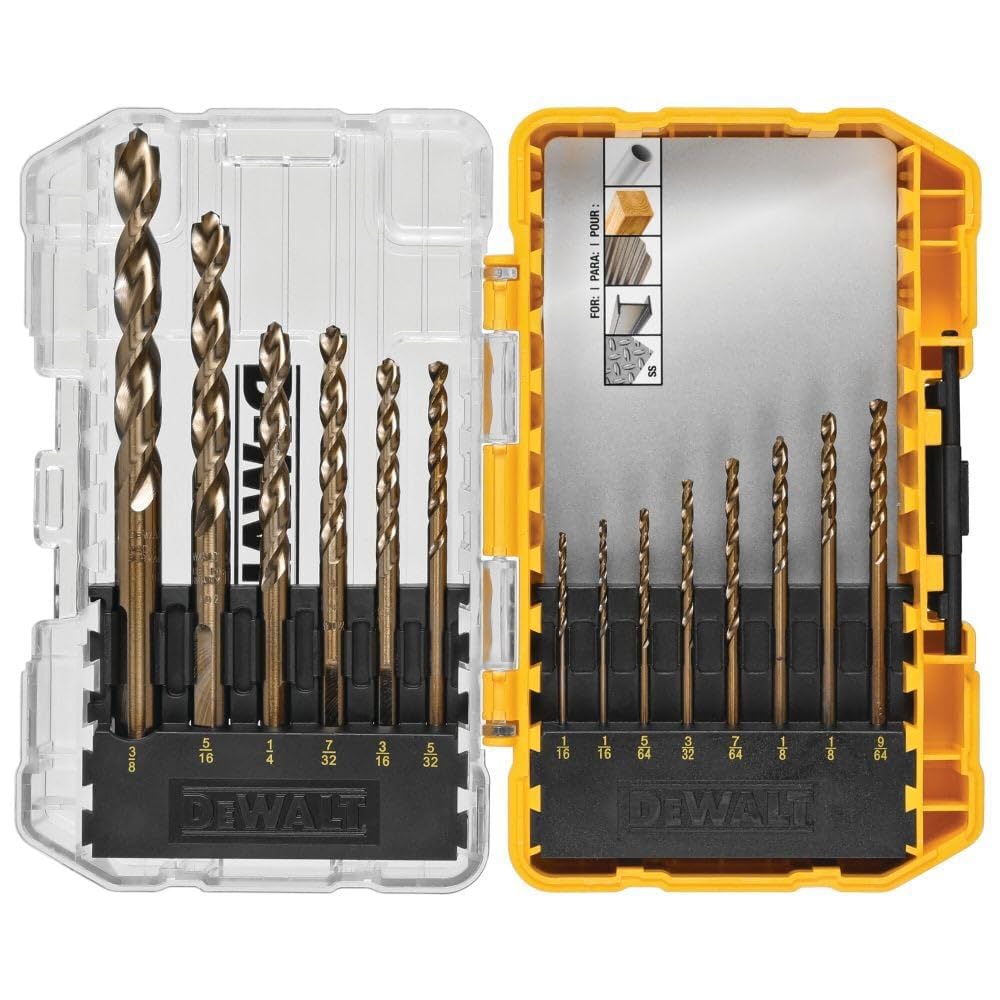
Specifications:
DeWalt is a trusted name in tools, and their industrial cobalt sets live up to the reputation. These bits are made from M35 cobalt steel, providing an excellent balance of hardness and durability for tackling tough materials.
- What’s good
The pilot point tip starts on contact and prevents walking, ensuring clean and accurate holes. The M35 cobalt construction provides excellent heat and abrasion resistance, making these bits a reliable choice for drilling into stainless steel, cast iron, and hardened steel. The tough case keeps the set organized and protected.
- What’s less good
While very durable, they are not as hard as M42 or solid carbide bits, so they may struggle with extremely hardened tool steels.
- Verdict
An outstanding all-around choice for professionals and serious DIYers. The DeWalt M35 set offers premium performance and reliability, making it one of the best drill bits for hardened steel in its class.
Reasons to Buy
Reasons to Avoid
2. Bosch 14-Piece M42 Cobalt Drill Bit Set

Specifications:
Bosch takes performance up a notch with their M42 cobalt bits. Containing 8% cobalt, these drill bits are designed for maximum heat and wear resistance, making them ideal for the most demanding applications.
- What’s good
The M42 cobalt alloy provides superior red-hardness, allowing the bits to maintain their cutting edge even at extreme temperatures. This makes them highly effective on materials like heat-treated steel and titanium. The thick web-helix design offers excellent stability and durability.
- What’s less good
The higher cobalt content makes them slightly more brittle than M35 bits, so care must be taken to avoid side-loading or flexing. They also come at a premium price.
- Verdict
For professionals who regularly work with the hardest metals, the Bosch M42 set is a top-tier investment. These are true industrial drill bits for metalworking and will outperform most competitors on challenging materials.
Reasons to Buy
Reasons to Avoid
3. Irwin 63137 / 316015 Cobalt Alloy Sets

Specifications:
Irwin offers robust and reliable M35 cobalt drill bit sets that are a favorite in many workshops. They are known for their heavy-duty construction and long-lasting performance.
- What’s good
These bits feature a 135-degree split point tip that cuts on contact and reduces walking. The M35 cobalt alloy ensures a long life even when used on tough materials like drill bits for stainless steel applications. The heavy-duty web construction adds strength and rigidity.
- What’s less good
The case, while functional, is sometimes cited as being less durable than the bits themselves.
- Verdict
The Irwin cobalt sets are a workhorse option, providing excellent durability and cutting performance at a competitive price point. They are a fantastic choice for anyone needing a dependable set of heavy-duty drill bits for hardened steel.
Reasons to Buy
Reasons to Avoid
4. Amoolo 13-Piece M35 Cobalt Drill Bit Set
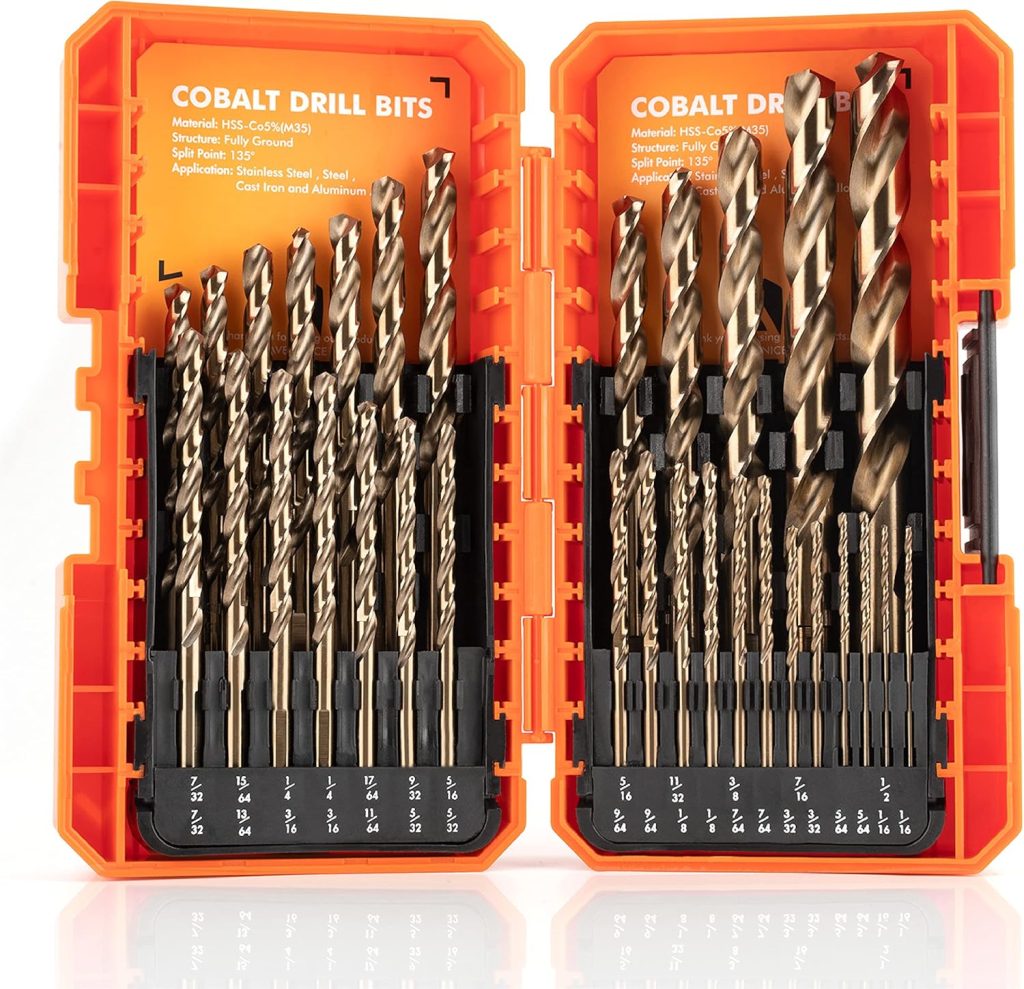
Specifications:
For those seeking a more budget-friendly entry into the world of cobalt, the Amoolo M35 set delivers impressive performance for its price.
- What’s good
This set offers the benefits of M35 cobalt—heat resistance and hardness—at a very accessible price point. The 135-degree split point prevents walking, and the bits are effective on stainless steel and other hard metals. It’s a great value proposition.
- What’s less good
The overall fit and finish might not be on par with premium brands like DeWalt or Bosch. Longevity under heavy, continuous professional use may be less than more expensive options.
- Verdict
An excellent budget pick. If you occasionally need to drill hardened steel and don’t want to break the bank, the Amoolo set provides the necessary material composition to get the job done effectively.
Reasons to Buy
Reasons to Avoid
5. Metric M42 Cobalt Twist Drill Bits Set
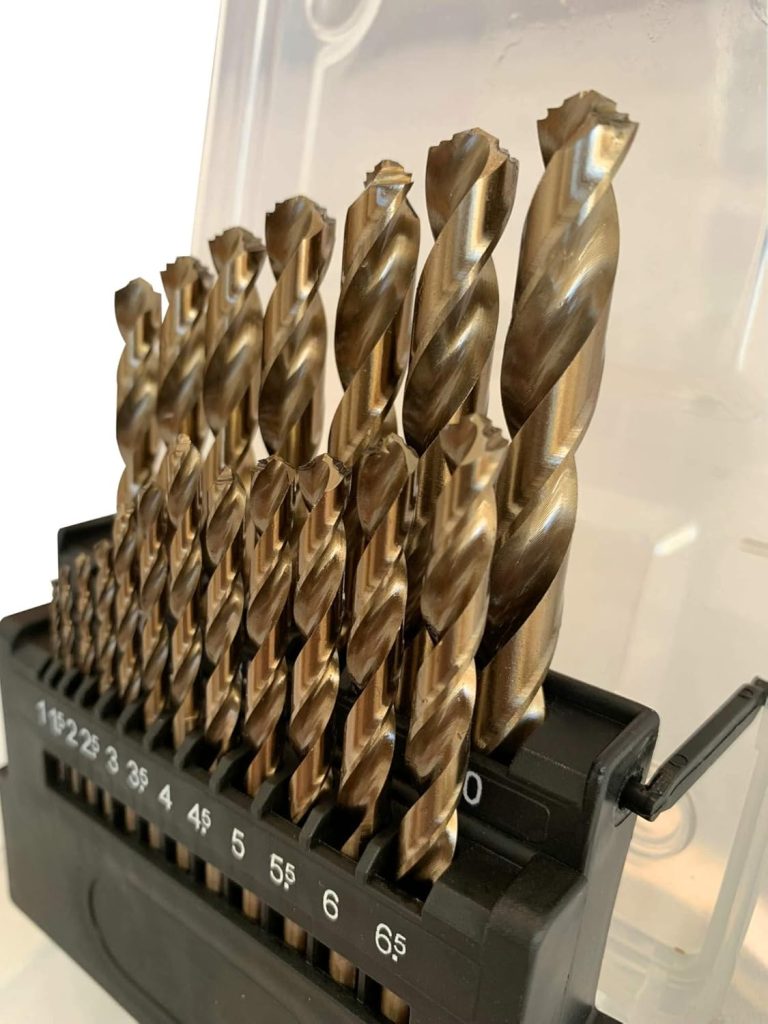
Specifications:
Many projects, especially in automotive or industrial settings, require metric sizes. This generic category represents the many high-quality M42 cobalt sets available in metric measurements.
- What’s good
These sets provide the superior heat resistance and hardness of 8% cobalt, making them perfect for drill bits for tool steel and other extremely hard alloys. The 135-degree split point ensures precision. Availability in metric sizes is crucial for many applications.
- What’s less good
Quality can vary between brands, so it’s important to choose a reputable seller. As with other M42 bits, they are more brittle and require careful handling.
- Verdict
An essential purchase for anyone working with metric fasteners or components. A quality Metric M42 set provides the ultimate performance for drilling the hardest steels when metric precision is required.
Reasons to Buy
Reasons to Avoid
6. Milwaukee Red Helix Cobalt Drill Bits
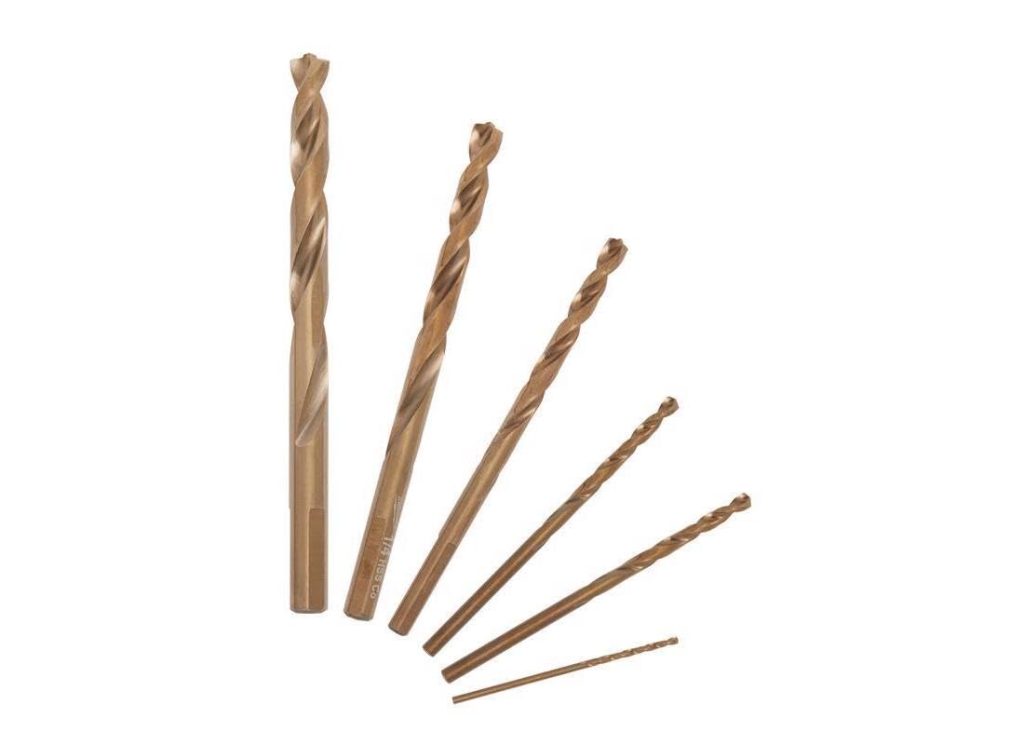
Specifications:
Milwaukee is renowned for its innovative tool designs, and their Red Helix cobalt bits are no exception. They are engineered for performance and durability in demanding metal drilling applications.
- What’s good
The standout feature is the Variable Helix™ design, which includes an aggressive 35-degree helix angle that ends at 15 degrees. This geometry helps pull chips out of the hole rapidly, reducing heat buildup and increasing cutting speed. The 135-degree split point prevents walking and the M35 cobalt ensures long life.
- What’s less good
They are a premium-priced option, and the unique flute design can be more challenging to resharpen correctly compared to standard bits.
- Verdict
A top-of-the-line choice for professionals who value speed and efficiency. The innovative design makes the Milwaukee Red Helix one of the best professional drill bits for hard metal, especially for rapid, repetitive drilling.
Reasons to Buy
Reasons to Avoid
7. DEWALT DW1263 14-Piece Cobalt Pilot-Point Set
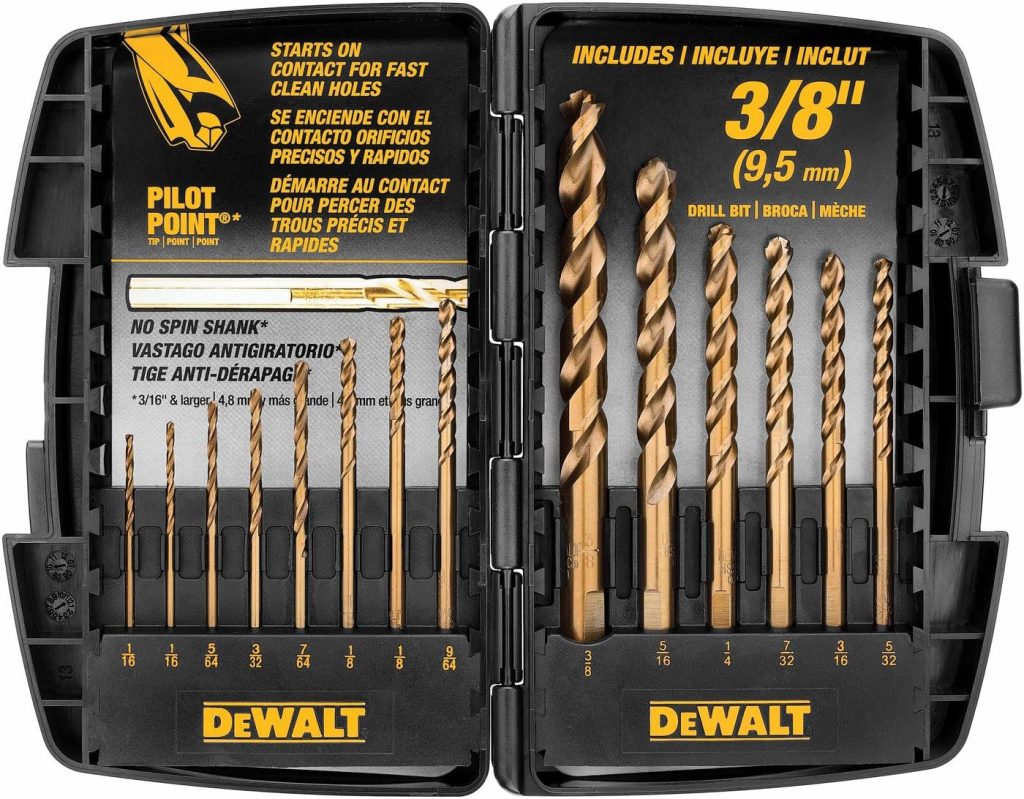
Specifications:
This is another excellent offering from DeWalt, focusing on their patented Pilot Point tip. This set is designed for precision and durability.
- What’s good
The Pilot Point tip is a standout feature, delivering clean, burr-free holes with exceptional accuracy. The M35 cobalt construction ensures these bits can handle high heat and are suitable for hardened steel. The industrial-grade case is extremely durable.
- What’s less good
The set has a somewhat limited size range compared to larger 29-piece kits, though it covers the most common sizes.
- Verdict
If hole accuracy and a clean finish are your top priorities, this DeWalt set is an exceptional choice. It combines the durability of cobalt with one of the best tip designs on the market.
Reasons to Buy
Reasons to Avoid
8. CO-Z / TEMO / Tooluxe Step-Drill / Mixed Sets

Specifications:
This category covers combination sets that often include step drills or a mix of cobalt, HSS, and titanium-coated bits. Step drills are particularly useful for drilling clean holes of various sizes in thin metal sheets.
- What’s good
Versatility is the key benefit. A mixed set can equip you for a wide range of tasks, and a cobalt step drill can be an excellent tool for enlarging holes in hardened sheet metal. They can offer great value by bundling different bit types.
- What’s less good
The quality of the individual components can be inconsistent. The cobalt bits in these kits may not be of the same grade as those from premium brands. Step drills are not suitable for drilling deep holes.
- Verdict
A good option for a home garage or for someone who needs a versatile kit for various materials, including occasional work on hard metals. Be sure to verify that the key bits are made from genuine M35 or M42 cobalt.
Reasons to Buy
Reasons to Avoid
9. Adiseal Ultimate Cobalt Bit (Single / Specialty)
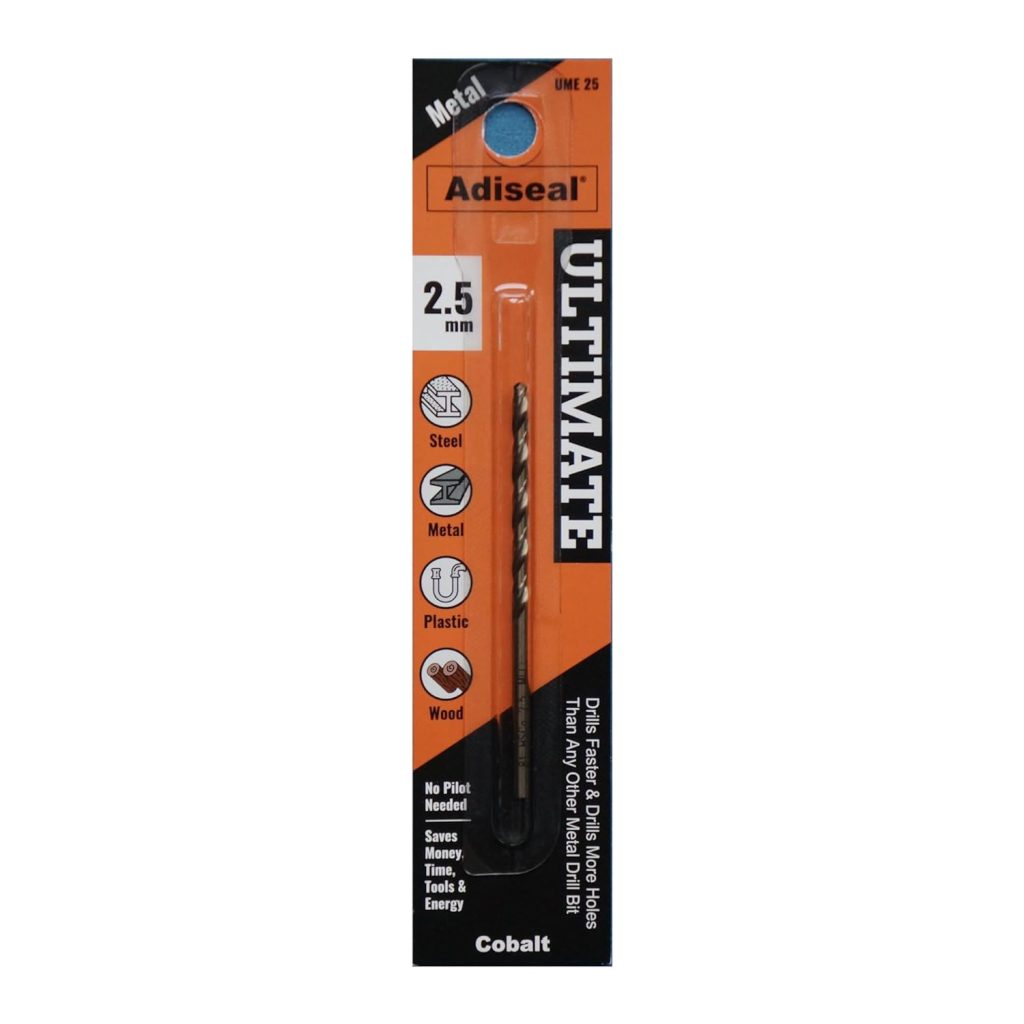
Specifications:
Sometimes you don’t need a whole set; you just need one or two specific-sized bits that are guaranteed to perform. Adiseal and other specialty brands offer single high-performance cobalt bits.
- What’s good
These bits are often made to extremely high standards, designed to cut through almost anything, including hardened steel, stainless steel, and cast iron, without needing coolant. They are perfect for specific, challenging tasks like drilling out a broken bolt.
- What’s less good
Buying single bits is significantly more expensive than buying a set. They are a specialty tool for when nothing else works.
- Verdict
When you have a critical, must-not-fail drilling task in extremely hard material, a specialty single cobalt bit is your best friend. It’s the problem-solver you keep in your toolbox for emergencies.
Reasons to Buy
Reasons to Avoid
10. Premium Carbide & Solid Carbide Bits
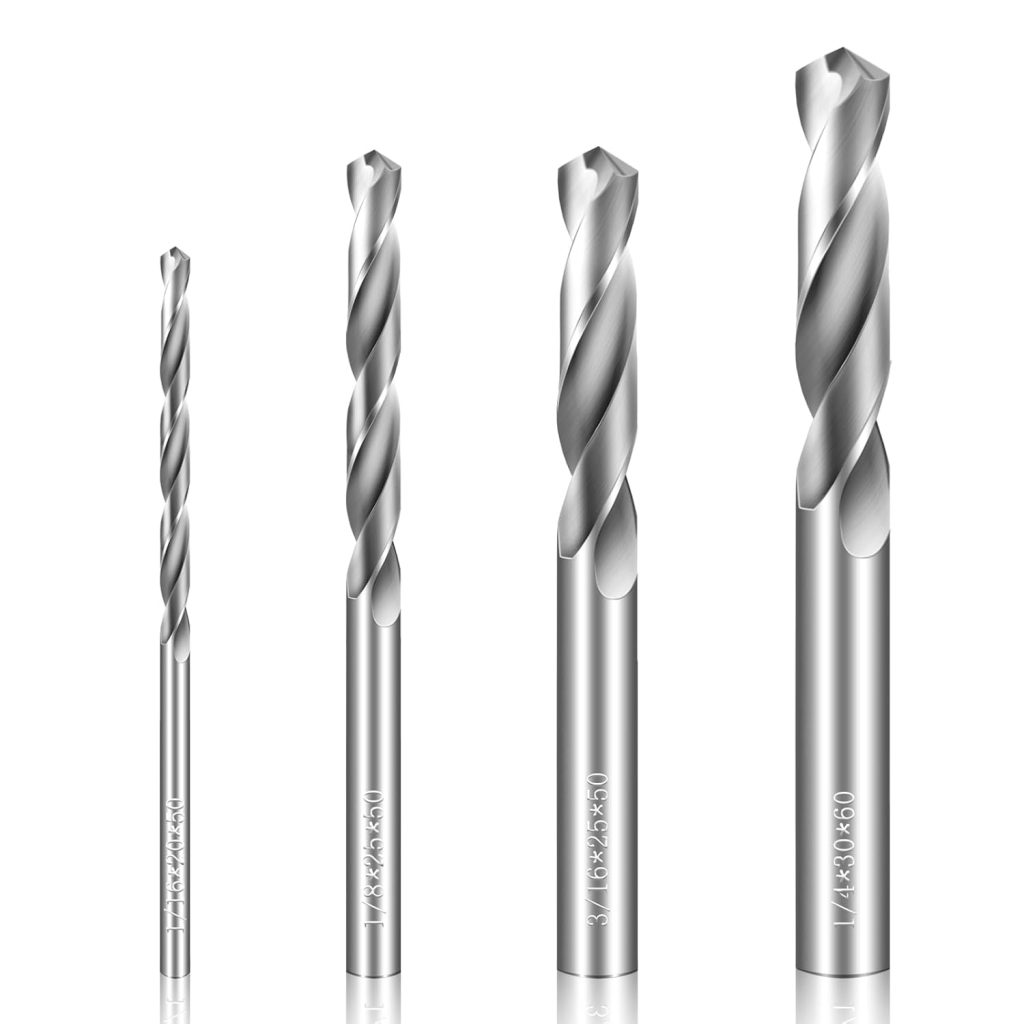
Specifications:
For the absolute peak of hardness and performance, solid carbide bits are the answer. These are not cobalt or HSS; they are made from solid tungsten carbide.
- What’s good
Unmatched hardness. Carbide drill bits for hardened steel can drill through materials that even M42 cobalt bits will struggle with, such as carbide-tipped tools or extremely abrasive alloys. They maintain their cutting edge longer than any other material under ideal conditions.
- What’s less good
They are extremely brittle and must be used in a stable setup like a drill press with a slow, steady feed rate. Any flexing or vibration can cause them to snap. They are also by far the most expensive option.
- Verdict
Reserved for highly specialized industrial drill bits for metalworking applications. If you are a machinist or fabricator working with exotic or ultra-hard materials, solid carbide bits are an essential but specialized part of your toolkit.
Reasons to Buy
Reasons to Avoid
How to Use Drill Bits Properly for Hardened Steel (Tips & Best Practices)
Owning the best drill bits is only half the battle. Proper technique is essential for success and for preserving the life of your expensive bits.
- Use a Drill Press
Whenever possible, use a drill press. It provides the stability, control, and consistent downward pressure needed to drill hard metals effectively. This minimizes the risk of bit breakage, especially with brittle carbide or M42 cobalt bits.
- Slow and Steady Wins the Race
Speed kills bits. High RPMs generate excessive heat, which will ruin the temper of the bit. Use a slow drill speed and a firm, steady feed rate. Let the bit do the work; don’t force it.
- Lubricate, Lubricate, Lubricate
Using a high-quality cutting fluid or oil is non-negotiable. Lubrication serves two critical purposes: it reduces friction and heat, and it helps flush chips from the hole. For hardened steel, a sulfurized cutting oil or a synthetic coolant is highly recommended.
- Peck Drilling
Don’t try to drill the entire hole in one go. Use the “peck drilling” method: drill for a few seconds, pull the bit out to clear the chips, add more lubricant, and repeat. This prevents chips from clogging the flutes and helps manage heat.
- Start with a Pilot Hole
For larger diameter holes, it’s best to start with a smaller pilot hole. This gives the larger bit a path to follow and reduces the amount of material it needs to remove, lowering the strain and heat generated.
- Secure Your Workpiece
Firmly clamp the material you are drilling. Any movement in the workpiece can cause the bit to bind, flex, and potentially snap.
Safety Tips
Working with hardened steel and high-powered tools demands respect and caution.
- Always Wear Safety Glasses
This is the most important rule. Metal shards and broken bit fragments can cause severe eye injury.
- Use Gloves (With Caution)
Wear gloves to protect your hands from sharp edges and hot metal chips. However, never wear loose-fitting gloves when operating a drill press, as they can get caught in the rotating spindle.
- Mind Your Hair and Clothing
Secure long hair and avoid wearing loose clothing or jewelry that could become entangled in the drill.
- Handle Bits with Care
Drill bits, especially the workpiece, will be extremely hot after drilling. Allow them to cool down before handling.
- Ensure Good Ventilation
Some cutting fluids can produce fumes. Work in a well-ventilated area.
Conclusion
Drilling into hardened steel doesn’t have to be a frustrating ordeal. Success hinges on a combination of the right tools and the right techniques. By abandoning standard HSS bits and investing in superior materials like M35 or M42 cobalt, you equip yourself for the challenge. For the most extreme applications, carbide remains the ultimate, albeit specialized, solution.
Remember to consider the crucial factors of material, coating, and bit geometry when making your selection. The reviews above offer a starting point, from the reliable performance of DeWalt and Irwin to the premium power of Bosch and Milwaukee.
By pairing one of these high-quality drill bits with a slow speed, proper lubrication, and a steady hand, you can cut clean, accurate holes in even the toughest of metals. Explore the recommended options, invest in quality, and transform a difficult task into a manageable one.
